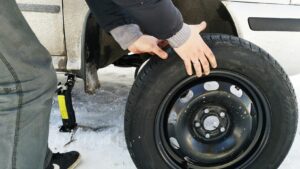Car Maintenance Tips for Beginners
- Regular Maintenance is Key: Consistent checks on oil, fluid levels, and tire pressure are essential to ensure vehicle safety and prolongs its lifespan.
- Understand Your Vehicle: Familiarize yourself with the manufacturer’s maintenance schedule outlined in the owner’s manual to avoid costly repairs.
- Empower Yourself Against Myths: Dispel common car maintenance myths, like the belief that only professionals can check oil levels or that all cars need oil changes every 3,000 miles.
- Essential Tools for Beginners: Equip yourself with basic tools like a wrench set, tire pressure gauge, and jack stands to perform maintenance tasks effectively.
- Seasonal Care Matters: Adjust your maintenance routine for seasonal changes, ensuring your vehicle is ready for winter cold or summer heat.
- Visual Inspections Can Prevent Issues: Regularly inspect wiper blades, tires, and battery health to catch potential problems before they become serious.

Owning a car can be a thrilling experience, but it also comes with responsibilities. For beginners, understanding the basics of car maintenance is crucial to keeping their vehicles running smoothly and efficiently. Regular upkeep not only enhances performance but also prolongs the life of the car, saving money in the long run.
From checking oil levels to maintaining tire pressure, simple maintenance tasks can make a significant difference. With a few easy tips, anyone can feel confident tackling their car’s needs. Learning these essential skills empowers new car owners to take charge of their vehicle’s health while avoiding common pitfalls.
Essential Car Maintenance Tips for Beginners
- Check Oil Regularly: Regular oil checks ensure the engine runs smoothly. Oil changes typically occur every 3,000 to 5,000 miles, depending on vehicle type and oil used.
- Maintain Tire Pressure: Proper tire pressure improves fuel efficiency and ensures safety. Check tire pressure monthly and before long trips, adjusting it according to manufacturer’s specifications.
- Inspect Fluid Levels: Regularly check coolant, brake fluid, and transmission fluid levels. Low fluid levels can lead to significant mechanical issues, so top them up as needed.
- Replace Air Filters: Frequent air filter changes enhance engine performance and efficiency. Inspect filters every 12,000 miles and replace them when dirty.
- Examine Wiper Blades: Functional wiper blades are crucial for visibility. Check them every six months and replace any that streak or skip.
- Rotate Tires: Tire rotation promotes even wear and extends tire life. Rotate tires every 5,000 to 7,500 miles, or as recommended by the vehicle manufacturer.
- Check Battery Health: Regular battery checks prevent unexpected failures. Inspect connections and clean any corrosion, testing battery charge every six months.
- Perform Brake Inspections: Effective brakes ensure safety on the road. Listen for unusual sounds and check pads and rotors for wear regularly.
- Keep Vehicle Clean: Regular washing and waxing protect the paint and body from rust. Clean the interior as well to maintain a pleasant driving environment.
- Follow Scheduled Maintenance: Adhering to the manufacturer’s maintenance schedule avoids costly repairs. Refer to the owner’s manual for specific service intervals.
Understanding the Basics of Car Maintenance
Understanding car maintenance basics helps new car owners take control of their vehicles. Regular attention to these tasks ensures safety, performance, and longevity.
Importance of Regular Maintenance
Regular maintenance prevents unexpected breakdowns and costly repairs. Keeping an eye on oil levels and fluid conditions helps sustain engine health. Tire pressure checks contribute to better fuel efficiency and handling. Scheduled inspections for brakes and batteries maintain safety and reliability on the road. Following the manufacturer’s manual ensures adherence to recommended service intervals, minimizing risks associated with neglect.
Common Car Maintenance Myths
Many misconceptions surround car maintenance. One prevalent myth is that professionals are the only ones capable of checking oil levels. In reality, beginners can easily learn to perform this task. Another myth suggests that all cars require oil changes every 3,000 miles; however, most modern vehicles often last up to 7,500 miles between changes. Assuming that premium fuel is necessary for all vehicles is also misleading, as most cars function optimally on regular gasoline. Lastly, the belief that only mechanics should inspect tire tread depth is incorrect; car owners can monitor tire wear using a simple penny test. Disproving these myths empowers car owners with confidence in managing their vehicle’s care.
Key Maintenance Tasks to Perform
Performing key maintenance tasks enhances vehicle performance and longevity. Regularly engaging in these activities helps beginners keep their cars in optimal condition.
Checking and Changing Oil
Checking oil levels monthly ensures proper lubrication of engine components. A dipstick indicates the correct level; if it’s low, add the recommended oil type. Changing oil every 5,000 to 7,500 miles maintains engine efficiency. It’s essential to use the right oil filter during changes to prevent contaminants from entering the engine. Dispose of used oil properly at designated recycling centers.
Inspecting Tire Health
Inspecting tire health involves checking pressure, tread depth, and overall condition. Maintaining tire pressure at the manufacturer’s recommended PSI promotes fuel efficiency and stability. Checking tread depth with a penny can determine whether tires need replacement; insert the penny with Lincoln’s head down—if the top of the head is visible, replace the tire. Regularly rotating tires every 5,000 to 7,500 miles ensures even wear and extends tire lifespan.
Replacing Air Filters
Replacing air filters enhances engine performance and fuel efficiency. Inspect air filters every 12,000 to 15,000 miles, or more frequently in dusty environments. A clean filter allows for adequate airflow, improving combustion and reducing emissions. Follow the vehicle’s manual for specific replacement intervals and consult a professional if unsure about the replacement process.
Seasonal Maintenance Tips
Seasonal changes require specific maintenance tasks to ensure a vehicle operates optimally throughout the year. Beginners should focus on preparing their cars for winter conditions and performing summer maintenance checks.
Preparing Your Car for Winter
Preparing a car for winter enhances safety and performance. Check the battery, as cold temperatures can weaken it. Ensure it has sufficient charge and clean the terminals. Inspect the tires for tread depth and winter suitability; consider switching to winter tires if driving in snowy areas.
Verify the windshield wipers, replacing any worn blades to improve visibility. Fill the washer fluid with a winter formula to prevent freezing. Examine the antifreeze levels in the cooling system; a proper mix of antifreeze and water prevents engine freeze. Lastly, check the vehicle’s heating system to ensure it functions correctly, providing comfort and safety during cold months.
Summer Maintenance Checks

Summer maintenance checks focus on keeping a vehicle cool in high temperatures. Start by inspecting the air conditioning system, making sure it blows cold air. Clean the condenser and ensure the refrigerant level is adequate for optimal performance.
Monitor the engine coolant level and inspect hoses for cracks or leaks. Maintaining proper coolant levels prevents overheating. Check the oil and consider changing it if necessary; higher temperatures can lead to faster degradation.
Inspect the tires for proper inflation and tread wear, ensuring safe handling on hot pavement. Clean or replace the cabin air filter to maintain air quality inside the vehicle. Regularly checking the brakes is crucial during summer trips, as heavy braking on hot roads may cause fading.
Tools Every Beginner Should Have
Every beginner should invest in a few essential tools to perform basic car maintenance tasks effectively. These tools facilitate routine checks and minor repairs, allowing for better vehicle care and maintenance learning.
- Wrench Set: A versatile wrench set allows for adjustments on various components, such as brakes and battery terminals. Most sets come in both metric and standard sizes.
- Screwdriver Set: A screwdriver set, including flat-head and Phillips-head types, is crucial for accessing and securing various parts of the car, like the battery cover or engine elements.
- Jack and Jack Stands: A reliable jack and sturdy jack stands are necessary for safely lifting the vehicle off the ground when changing tires or inspecting the undercarriage. Ensure the jack can support the vehicle’s weight.
- Pliers: Pliers assist in gripping, twisting, and cutting wires, making them useful for tasks like replacing fuses or tightening hoses. A multi-purpose set of pliers is recommended.
- Oil Filter Wrench: An oil filter wrench simplifies removing the oil filter during oil changes, which enhances efficiency and reduces mess, promoting regular oil maintenance practices.
- Tire Pressure Gauge: A tire pressure gauge accurately measures tire pressure, ensuring optimal inflation for safety and fuel efficiency. Regularly checking tire pressure contributes to better handling.
- Flashlight: A durable flashlight is essential for low-light situations, such as checking under the hood or inspecting tire conditions during evening or early morning work.
- Funnel: A funnel aids in pouring liquids, like oil or coolant, without spills. This tool ensures clean pouring while performing fluid checks or changes.
- Multimeter: A multimeter measures voltage, current, and resistance, which is helpful for diagnosing electrical issues, especially in battery and starter systems.
- Jump Starter: A portable jump starter can jump-start a dead battery without the need for another vehicle. It’s a practical safety tool for any car owner.
Investing in these tools not only enhances a beginner’s ability to perform basic maintenance but also fosters confidence in managing their vehicle’s well-being.
Ensure Vehicles Run Smoothly
Embracing car maintenance is vital for beginners who want to ensure their vehicles run smoothly. By mastering basic tasks and investing in essential tools, new car owners can take charge of their vehicle’s health. Regular checks and seasonal preparations not only enhance performance but also prevent unexpected breakdowns.
With the right knowledge and confidence, managing car care becomes a rewarding experience. Prioritizing maintenance leads to a safer driving experience and can save money in the long run. By following the tips outlined, beginners can cultivate a proactive approach to car ownership, making their journey on the road more enjoyable and stress-free.

